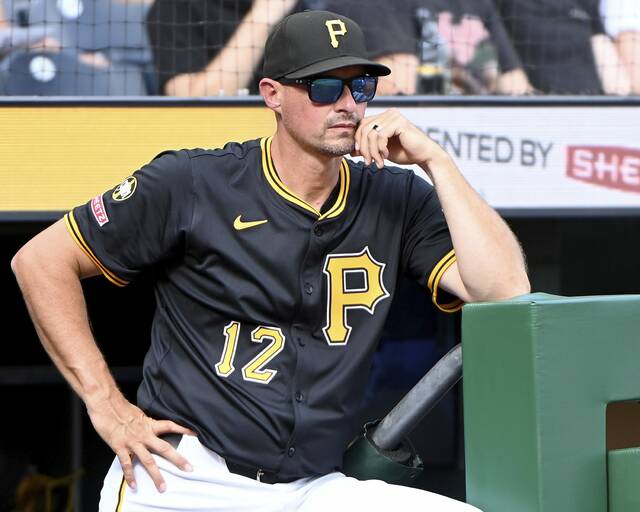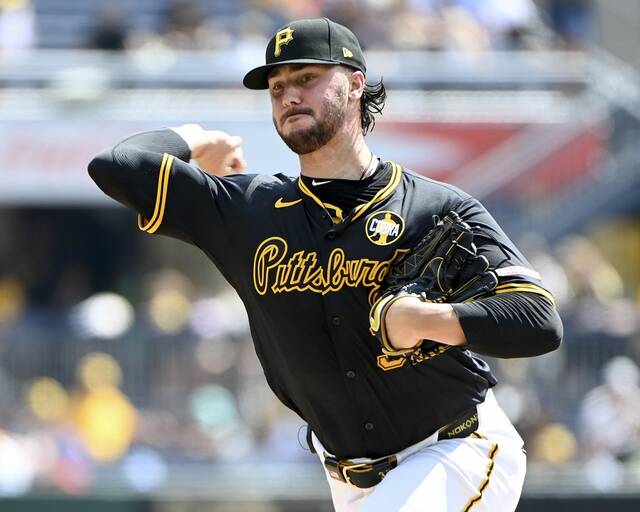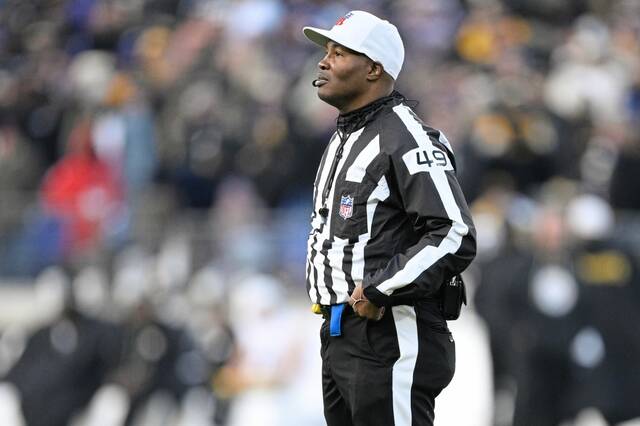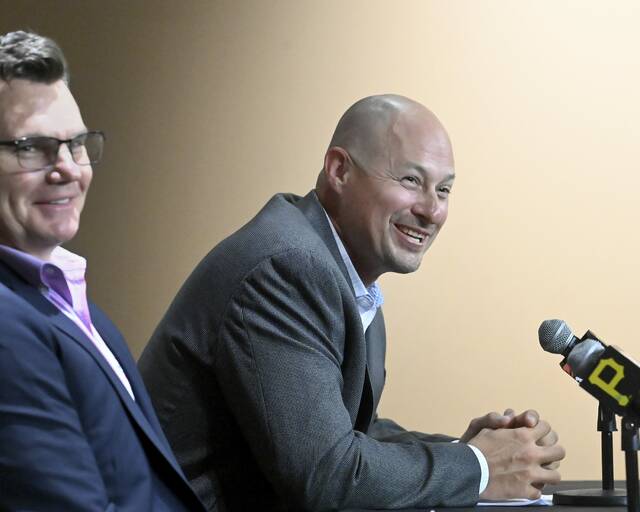The only things that came down faster than the rainstorm that interrupted the game at PNC Park on Tuesday night were the hyperbolic reactions from the Pittsburgh Pirates and San Diego Padres.
When a flash flood clogged the drainage system with dirt and flooded the outfield, players and coaches likened the warning track to bodies of water.
Pirates manager Derek Shelton called it a pond. Padres center fielder Jackson Merrill referred to it as a river, then a lake. Padres reliever Bryan Hoeing went further in his exaggeration of the excess water.
“There was an ocean in the warning track,” Hoeing said. “It was nowhere ready to play the game.”
The puddle in the North Side Notch section of the warning track is holding things up. https://t.co/cRhc0KGKIB pic.twitter.com/fKSw7O5uGo
— Kevin Gorman (@KevinGormanPGH) August 7, 2024
Two hours and 40 minutes after the stoppage of play, after the grounds crew rolled out squeegees and shoveled dirt to clean up the North Side Notch in left center and the puddles below the Clemente Wall in right field, the teams finally resumed play. A game that stopped at 7:01 p.m. began the bottom of the second inning at 9:41 p.m. and didn’t end until after midnight. The 2-hour, 40-minute delay lasted longer than the actual game, which was played in 2:37.
A source told TribLive that the Pirates hired an outside company to address the drainage issues Wednesday morning. That included digging up around the drain, replacing a piece of the pipe, jet-cleaning the system to suck up any debris and tilling the red clay on the warning track to promote drainage, in case another storm hits.
The Pirates promised fans a pair of complimentary tickets as a reward for their patience. By then, much of the crowd of 17,814 had headed for the exits. The “drain delay” tested the resolve of players, especially after it was announced that the game would resume at 8:15, in hopes that the starting pitchers could continue — only for another hour to pass before the field was deemed safe to play. That delay forced the teams to tax their bullpens by using a combined nine relievers.
“We just don’t get why we waited that much longer. What’s the point? Two hours, 40 minutes was too long. We’ve got a game today. It’s crazy,” Pirates center fielder Ji Hwan Bae said after the 6-0 loss, voicing his frustration with the elongated delay through interpreter Daniel Park. “I just thought that if it was going to take a long time to drain the water, they should have called the game earlier and not make us wait.”
Game officials decided not to wait for the storm to pass to start the game on time, MLB vice president of umpire operations Matt McKendry explained by speakerphone to pool reporter Noah Hiles of the Pittsburgh Post-Gazette, because of differing weather reports. One had the rain arriving shortly after 7 p.m., while several others projected it closer to or even after 8.
McKendry said both clubs and representatives from the commissioner’s office discussed the forecast, the pros and cons of starting on time in dry weather versus waiting to start the game at a later time.
“It wasn’t a clear-cut decision, but when we talked through it, we thought the best thing to do was to try and get started and play for as long as we could before the rain came in,” McKendry said in the pool report. “Obviously, the more pessimistic forecast came through and it started raining much earlier than what we would’ve liked, so we only played an inning and a half before we went into a delay.”
Game is set to resume at 8:15 pm. https://t.co/a1r7V6j0Sa
— Kevin Gorman (@KevinGormanPGH) August 7, 2024
The delay lasted longer than an hour, and Padres starter Dylan Cease threw warmup pitches on the mound before it became apparent that the outfield wasn’t playable. As the grounds crew worked on the flooded North Side Notch, the nook adjacent to the bullpen, players were stunned to see so much water on the warning track.
“I mean, it was a damn lake in the beginning,” Merrill said. “Before, they said it was 8:15 and there was still a whole river in the outfield. Stuff happens, you have to wait sometimes. … I said, ‘Dude, I don’t care if there’s a lake out there or a river. I’m going to play. I don’t care.’ ”
Clearing the water took another hour. The clogged drains dissipated slower than anticipated, requiring the grounds crew to use pumps to suck the water off the warning track.
“We were optimistic that the grounds crew was going to be able to clear those drains out in the outfield,” McKendry said, “and that the water level would go down much quicker than it actually did.”
Pirates reliever Hunter Stratton watched in disbelief from the bullpen, surprised to see the field flooded for the second time in two weeks. The Pirates also had drainage issues Saturday, when they endured a 68-minute rain delay in the fourth inning against Arizona.
“Until they got the pumps out there, there was no chance,” Stratton said. “Once they got all the standing water off, it was still pretty mushy out there. I was pretty surprised we actually played because of how bad the warning track was.”
Where Shelton credited Pirates groundskeeper Matt Brown and his crew for their work, Padres manager Mike Shildt was complimentary of how Brown and umpire crew chief Andy Fletcher handled the situation.
“I can’t praise Andy Fletcher and the umpiring crew any more,” Shildt said. “That was a tough predicament.”
Fletcher and his crew stood in right field, conferring with Shelton and Shildt and MLB officials to determine whether the field was playable.
McKendry stressed that player safety was “paramount,” and officials wanted to make sure both clubs were comfortable putting their players back on the field without risking injuring from losing their footing.
“It’s my job to try to get the game in, if at all possible, keeping in mind that players’ safety is of the utmost importance,” Fletcher said in the pool report. “I wasn’t going to play the game until I was satisfied that the field was safe enough to play. We had several conversations with both managers and shared opinions on what we thought. For a good, long while, we didn’t feel that it was a safe situation.
“Once we got to a point where they had done everything they could do to the field, they got to a point where I felt it was safe to play. We had a conversation about it and everybody regrouped, got back together and decided that we could do this.”
It was just Merrill’s luck that when the game resumed the first ball in play was a line drive to the warning track in center by Pirates shortstop Isiah Kiner-Falefa.
“Of course, the first ball is to the track,” said Merrill, a 21-year-old rookie. “When I hit the track, I just slowed it down. Was careful about it.”
Bae wasn’t as fortunate. When Tyler Wade hit a fly ball to center in the fifth, Bae attempted to make a sliding catch. The grass was like a slip-and-slide that sped him past the ball, which hit off his glove for an RBI single that gave the Padres the lead in a four-run fifth.
Where Bae wished the game would have been postponed, Andrew McCutchen wanted to get it in. No matter how long the delay, the 37-year-old Pirates designated hitter knew the alternative would be just as miserable, if not more so.
“I can’t speak for everyone, but I’d much rather play the game than show up for a doubleheader tomorrow,” McCutchen said, before realizing that it was 12:23 a.m. “You’re here at the field all day, followed by a 12:35 game the next day. We got it in. Rest up, get ready for (another game) later today.”








